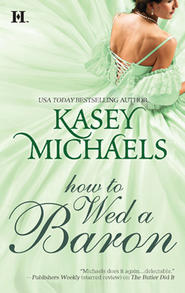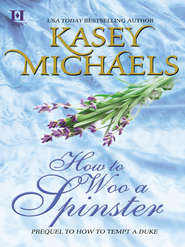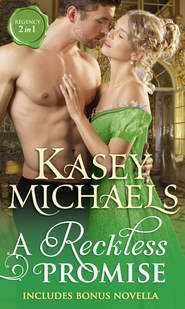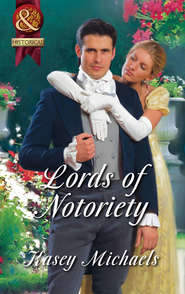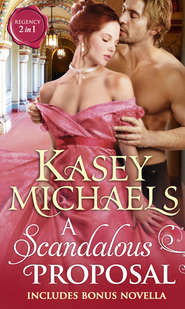По всем вопросам обращайтесь на: info@litportal.ru
(©) 2003-2024.
✖
The Bride of the Unicorn
Настройки чтения
Размер шрифта
Высота строк
Поля
Along with many other of his uncle James’s deathbed assertions, Morgan was still having more than a little difficulty believing that his father had ever been a carefree youth. William Blakely, as far as Morgan could see, had been born full grown, with no notion of what it was like to be young, to career around the countryside with some of the tenant farmers’ sons, changing signposts and liberating chickens from their coops, or cutting a lark in the village—or even laughing out loud at the dinner table.
When he couldn’t talk Morgan into seeing his point of view, or sermonize him into sensibility, William had taken to whipping the “frivolous frolic” out of his son, punishing Morgan for setting an unsavory example for his young brother, Jeremy. Those whippings had come to an abrupt halt when, at the age of thirteen, Morgan pulled the switch from his father’s hand and flung it across the room, daring the man to come at him with his fists.
The next day, over his weeping mother’s protests, Morgan had been packed off to boarding school for most of each year, where he instantly became an outstanding, if not outstandingly well behaved, student. Two summers later his mother died peacefully in her sleep, and William buried his grief by way of a closer association with religion, a turning point that Morgan now saw as the worst possible catastrophe to strike the Blakely sons.
Jeremy, three years Morgan’s junior, was not allowed to rejoin his brother at school once the year of mourning was over, as William had decided to continue tutoring his younger, more beloved—more tractable—son at home, preparing him for a life among the clergy. After all, as the duke had said at the time, heaven only knew boarding school was not proving capable of knocking any sort of sense of responsibility into his older son.
But the duke hadn’t counted on Morgan’s compelling personality or Jeremy’s near worship of his hey-go-mad, neck-or-nothing older brother, who appeared in his orbit for only a few months a year. In the end, Morgan was sure, it was that love, that devotion, that misplaced adoration, which had led Jeremy to follow that older brother into war—and to his death.
And William Blakely, devastated by this additional loss, had turned even more devotedly to his God, and away from his remaining son.
Morgan pushed aside his memories as the wide front doors of The Acres opened and a footman raced to offer his assistance. Morgan dismounted, patted the bay’s rump, and instructed the boy to make sure a groom rubbed the horse down well before he fed and watered him. And then, knowing the coach carrying his oddly assorted entourage would not arrive for at least another hour, he took a deep breath, squared his shoulders, and walked up the steps to enter his father’s house.
“Good day, m’lord,” Grisham, the family butler—who had more than once hidden a filthy, bruised, much younger Morgan so that his father would not see that he had been fighting with one of the village boys again—inclined his balding gray head stiffly and held out his hands to take the marquis’s riding crop, hat, many-caped greatcoat, and gloves. “We had thought when you left yesterday morning that it was for a return to Clayhill. Is his grace expecting you?”
Morgan laid a hand on the man’s shoulder. “Now, Grisham, what do you suppose?”
The butler lowered his eyelids and pressed his chin toward his chest. “Forgive me, m’lord.” Then he raised his head once more and smiled. “But, if I may be allowed to say so, sir, I am extremely pleased to see you again.”
“You are most definitely allowed to say that, old friend, and thank you.” Morgan looked around the high-ceilinged entrance hall, then toward the closed doors to the main drawing room. “Is my father in there?”
“No, m’lord,” Grisham answered, his voice rather sad. “He’s where he is every day at this time. In young Master Jeremy’s rooms.”
“Sweet Jesus, Grisham, does the man enjoy suffering?” Morgan shook his head. “Well, there’s nothing else for it—I’ll have to go upstairs. Do you have any sackcloth and ashes about, old friend, or do you think this road dirt I’m wearing is enough to make me look the penitent?”
The butler didn’t answer, but only stood back, bowing, so that Morgan had nothing else to do but walk toward the wide, winding staircase. He reached the bottom step before he turned. “My coach will be arriving within the hour, Grisham. Inside it will be three women—I cannot bring myself to call them ladies, I fear, at least not until they are all bathed—and a young, smallish gentleman. Please see that three rooms are prepared in the guest wing, and one in the servants’ quarters. I believe you’ll have no great difficulty ascertaining which of our new residents belongs under the eaves. Simmons—my valet, as you might remember—is riding atop the coach with my driver. He’ll see to the unpacking of my things. Tomorrow will be soon enough for him to ride to Clayhill to collect more of my wardrobe, for I am planning an extensive stay here at The Acres.”
“Yes, m’lord,” Grisham said, bowing yet again, his face expressionless. “That is wonderful news. And should I order three extra places set for supper, for your guests?”
Morgan scratched at a spot just behind his right ear. “I don’t think so, Grisham. Our guests can bathe, then dine in their rooms. I don’t wish to push my luck.”
“Very good, sir. I’ll see that your instructions are carried out to the letter.”
Smiling, Morgan returned the butler’s formal bow. He could always count on Grisham to stick to business, without turning a hair at what the marquis knew was an outrageous set of instructions. “You do that, Grisham,” he said, turning to head up the stairs two at a time. “Oh,” he added, looking back over his shoulder, “and you might want to hide any valuables that may be lying around in the bedchambers. Just on the off chance any of our guests decide to cut short their stay with us in the middle of the night.”
Morgan’s smile faded as he climbed the stairs to the first floor of the forty-year-old house. The original estate house had burned to the ground ten years before Morgan’s birth, and the duke and his lady wife had perished in the blaze. The new H-shaped building, although fashioned very much like its predecessor on the outside, had been divided in the new, modern way, with the public rooms on the ground floor and extensive family chambers on the first floor.
Jeremy’s rooms were located to the left of the top of the staircase, through a door at the end of a wide hallway lined with oil paintings depicting bucolic country scenes found nowhere on this particular estate, several doors beyond Morgan’s former bedchamber. The duke’s chambers occupied a large area in the middle of the house, with the guest rooms taking up the wing to the right of the staircase. The nursery was on the third floor, half of which was also devoted to quartering the upper servants. The kitchen servants and, for tonight at least, Mary Magdalene O’Hanlan, had their beds in small cubicles under the eaves in a section of the attics.
Morgan’s mother had been in charge of furnishing the house, for nothing save a few portraits and several sticks of furniture had survived the blaze, and her good taste could be clearly seen in the light colors and delicately carved furniture that would make any outsider believe that The Acres was a well-loved, happy home.
Only it wasn’t. It was a shrine, or at least a part of it had been turned into a shrine, one dedicated to the memory of Lord Jeremy Blakely, dead these past two years, four months, three weeks, and five days.
Morgan pulled a face as he realized what he had been thinking. He was no better than Ferdie Haswit, ticking off the days from the termination of his personal world, his personal happiness, in much the same way that Ferdie was counting down the days until, if his prediction proved correct, the entire world would end.
Should he, Morgan, be locked up alongside Haswit in a place like Woodwere? Should his father the duke be incarcerated there with him? Or was Ferdie Haswit the sane one? How did the world make these judgments? And why, Morgan wondered briefly before dismissing his random thoughts, did any of it matter in the first place?
He approached the door at the end of the hallway, hesitating only slightly before depressing the latch and stepping into the small antechamber that led directly to his brother’s bedroom. “Father?”
There was no answer, which Morgan considered to be a great pity, for it meant he would have to go searching the three large rooms of the apartment for the man. It wasn’t an expedition he looked forward to with any great anticipation. Steeling himself to blank-faced neutrality, he advanced into the apartment, deliberately refusing to look to his left, where Jeremy’s life-size portrait hung against the wall, or to his right, where his brother’s collections of bird’s nests, oddly shaped stones, and ragtag velveteen stuffed animals were displayed on table tops.
Morgan knew without looking that every piece of clothing Jeremy had worn in the last months he’d been at home still hung in the wardrobe in the far corner.
Jeremy’s silver-backed brushes gleamed dully in the half-light, as this wing was on the shady side of the house and the sun had already made its circuit past its many windows.
His brother’s riding crop, a birthday gift from Morgan, was curled on the coverlet on his bed.
The lopsided birdhouse Jeremy had hammered together at the age of six was displayed on the night table.
A pair of mittens knitted by their mother for his fifth birthday lay on a chest at the bottom of the bed.
And a Bible, opened to the Twenty-third Psalm, rested on the desk where Jeremy had written his farewell note to his father before riding away in the middle of the night to seek out the adventure he would never have found at The Acres.
Jeremy’s rooms were exactly as they had been before he went off to war, to join his brother, his idol, and eventually to die a terrible death in that brother’s arms.
“You say you have forgiven me, Father,” Morgan said softly, giving in, only momentarily, to the pain. “Yet this room is still here, still the same. How can you truly forgive if you refuse to forget?”
“Who’s there? Grisham? How many times must I tell you that I do not wish to be disturbed when I am in here? Is there no peace to be found anywhere in this world? No compassion?”
Morgan took another step into the room, to stand just at the edge of the carpet. “No, Father, as a matter of fact, I don’t believe either of those things does exist,” he said, espying the duke standing just beside the windows, his thin face eloquent with pain. “Just as there is no real forgiveness, no entirely selfless charity, and precious little understanding.”
He took two more steps, turning to peer into the smiling blue eyes of his brother, brilliantly captured in the painting that was done on his seventeenth birthday, then slanted a look full of meaning at his father. “There is, however, revenge. The Old Testament, I believe, is chock full of it. An eye for an eye, a tooth for a tooth—and, in admittedly a rather backhanded, perverse way, a child for a child. Tell me, Father, are you at all interested in winning some revenge of your own?”
CHAPTER SIX
With how much ease believe we what we wish!
Whatever is, is in its causes just.
John Dryden
CAROLINE LOOKED DOWN at her fingertips and the skin that was still soft and puckered from her bath, the first she had ever taken in a tub. She lifted her wrists to her nose, sniffing at the delicate scent of rose hip soap, a smile coming to her face as she raised her shoulders and rubbed her cheek against the collar of the soft pink terry wrapper the maid, Betts, had provided her with after helping her dry herself with huge white towels that had been warmed beside the fireplace.
Beneath the wrapper was a miles-too-long white cotton nightgown, old and mended, but with touches of lace at the hem, high collar, and cuffs. It had been one of Lord Clayton’s mother’s nightgowns, Betts had told Caroline, long since passed on to the servants’ quarters and well worn. Caroline thought it to be the most beautiful nightgown in creation.
She had told Betts, smiling at the girl, who was no more than a few years older than she—and who appeared to be shocked speechless at the admission—that she had slept in her shift in the summer and in the same clothes she worked in during the colder months. Betts’s possible disapproval had kept Caroline silent about the fact that, during the hottest nights, tucked up under the eaves in her narrow cot, she had dared to sleep with no clothing covering her at all.
Clucking her tongue over the sad state of Caroline’s bitten nails, Betts had nevertheless taken care to rub a perfumed ointment of crushed strawberries and cream into her new mistress’s hands, vowing that it would soon heal the dry, chapped skin, then solemnly repeated these ministrations on Caroline’s roughened feet and heels, an embarrassing and somewhat ticklish process that had made Caroline giggle nervously.
Betts had also helped her to wash her hair, then exclaimed that it was three shades lighter than it had been before the determined scrubbing that brought tears to Caroline’s eyes. Now, hanging halfway down her back, each strand free of tangles, Caroline’s hair was only faintly damp, for Betts had brushed it dry as the two of them sat on the hearthrug, warmed by the fire.
Now, lying back against the pillows as she sat cross-legged in the middle of the large tester bed, Caroline placed a hand on her stomach, enjoying the unfamiliar feeling of fullness that lingered a full two hours after her meal, which had been served on a silver platter—nothing like the wooden trencher she had used at Woodwere or the chipped bowl that was dipped into the common gruel pot at the orphanage. She was so full, in fact, that she didn’t believe she could eat above two of the half-dozen soft, crusty rolls she had stuffed into her bodice while Betts’s back was turned and later hidden behind one of the cushions on the chair in the corner.
Betts, before she left, had put forth the hope that “Lady Caroline” would have a restful night, and she had watched proprietarily as a footman slipped a warming pan between the sheets. Once the door closed behind the maid, Caroline had investigated every drawer and cabinet in the room, lifted each exquisitely formed figurine, inspected every small decoratively carved wooden chest and dainty porcelain box, sniffed at the contents of the crystal bottles on the dressing table, then whirled around in a circle in the middle of the room, arms outflung, laughing aloud at her good fortune.
All in all, Caroline decided happily now, looking around the candlelit room, she truly must have died—and this was heaven.
She had just stifled an unexpected yawn and was about to slip her toes beneath the coverlet, reluctantly giving in to sleep, when the door to the hallway opened once more and Miss Twittingdon—dressed in her ridiculous blue and purple plaid woolen wrapper and pink knitted slippers—entered, to stand beaming at Caroline.






